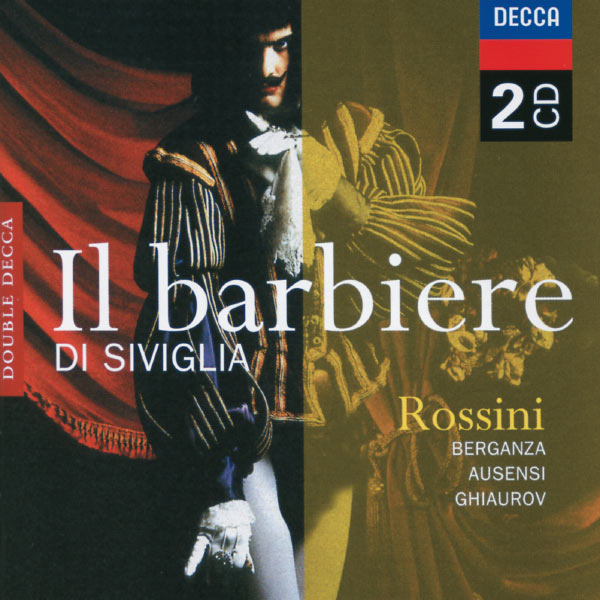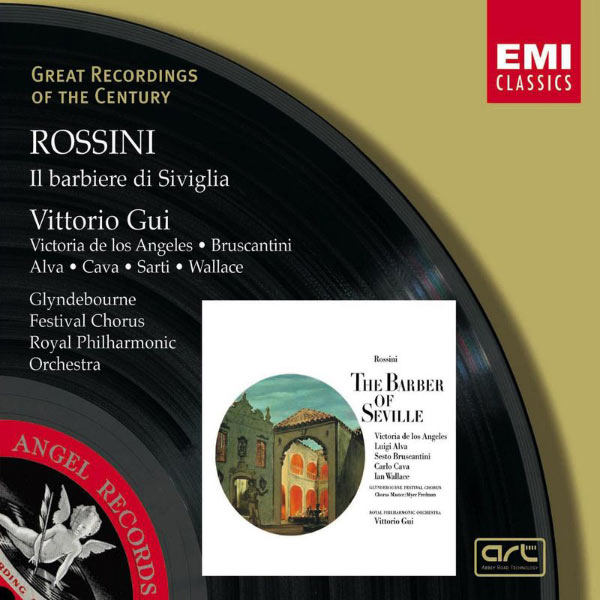Rossini Il barbiere di Siviglia
View record and artist detailsRecord and Artist Details
Composer or Director: Gioachino Rossini
Genre:
Opera
Label: Decca
Magazine Review Date: 5/1992
Media Format: CD or Download
Media Runtime: 145
Mastering:
Stereo
ADD
Catalogue Number: 417 164-2DM2

Tracks:
| Composition | Artist Credit |
|---|---|
| (Il) Barbiere di Siviglia, '(The) Barber of Seville' |
Gioachino Rossini, Composer
Dino Mantovani, Fiorello, Bass Fernando Corena, Doctor Bartolo, Baritone Gioachino Rossini, Composer Manuel Ausensi, Figaro, Baritone Naples Rossini Chorus Naples Rossini Orchestra Nicolai Ghiaurov, Don Basilio, Bass Silvio Varviso, Conductor Stefania Malagù, Berta, Mezzo soprano Teresa Berganza, Rosina, Mezzo soprano Ugo Benelli, Almaviva, Tenor |
Composer or Director: Gioachino Rossini
Genre:
Opera
Label: Rossini Edition
Magazine Review Date: 5/1992
Media Format: CD or Download
Media Runtime: 141
Mastering:
ADD
Catalogue Number: 764162-2

Tracks:
| Composition | Artist Credit |
|---|---|
| (Il) Barbiere di Siviglia, '(The) Barber of Seville' |
Gioachino Rossini, Composer
Carlo Cava, Don Basilio, Bass Duncan Robertson, Fiorello, Bass Gioachino Rossini, Composer Glyndebourne Festival Chorus Ian Wallace, Doctor Bartolo, Baritone Laura Sarti, Berta, Mezzo soprano Luigi Alva, Almaviva, Tenor Royal Philharmonic Orchestra Sesto Bruscantini, Figaro, Baritone Victoria de los Ángeles, Rosina, Mezzo soprano Vittorio Gui, Conductor |
Author: Richard Osborne
Perhaps it is a shade misleading to refer to this classic 1962 EMI recording as a ''Glyndebourne'' set. It has all the ingredients of a Glyndebourne production: notably the cast, the orchestra and chorus, and that doyen of Rossini conductors, Vittorio Gui. But as far as I can see there was no actual stage production of Il barbiere in 1962. Nor was the recording, for all its dryness and sharp-edged immediacy, actually made in Glyndebourne. It is a well-honed, conservatively staged stereophonic studio recording made by EMI in their Abbey Road Studio No. 1 at the conclusion of the 1962 Glyndebourne season.
The Decca recording was made in Naples, and though the orchestral sound is as immediate and beautifully focused as on the EMI set, the stage picture is bigger and more diffuse, with a wider range of special effects. Some of these, such as the hammering at the door at the start of the Act 1 finale, are otiose. But what is worse is the blur of space around the voices in several key scenes. It is nice to have a really rowdy riot near the start of the opera; but I am less happy when a singer like Ausensi (described by Philip Hope-Wallace as ''robust but unmercurial'') is made to sound even more blustery than he already is.
For all the astuteness of Varviso's conducting, the Decca set now has a slightly old-fashioned feel to it. Ghiaurov's Don Basilio goes back to the hammy old Chaliapin tradition (his ''La calun- nia'' is down a tone in C where Gui's Carlo Cava sings it in the original key of D); and Fernando Corena is—well, Fernando Corena: a fine old 'character' actor who makes contact with the letter of the score less often than one might wish. Gui's Dr Bartolo, Ian Wallace, is also a fine old character actor, but he is given much more space by Gui. This allows his portrait of Dr Bartolo to emerge as a classic compromise between the letter and the spirit of the part.
And here, indeed, we have the secret of Gui's way with Il barbiere. It is a performance so astutely paced that whilst the music bubbles and boils every word is crystal clear. This—to take up Verdi's point—is a wonderfully declaimed reading of the score, but also a beautifully timed one. Gui's steady tempos also allow the music to show its underlying toughness. We are reminded how radical a piece this was in 1816: a score whose initial popularity was with aficionados like Beethoven rather than with the public at large. Gui also secures characterful playing from the RPO, from the wind players in particular. Back in 1962, the RPO (still very much Beecham's creation) was the resident Glyndebourne orchestra.
There is not, perhaps, a great deal to chose between the two Almavivas; or between the two Spanish-born Rosinas. Berganza (Decca) could seem bland on record but this is a bubblier performance than I had remembered. Where Victoria de los Angeles is so memorable is in the beauty of her singing and the originality of the reading. She is much less of a virago in this role than her famous Spanish predecessor Conchita Supervia; and less of a virago than Callas with Galliera on EMI. I have never heard a Rosina who manages to be both as guileful and as charming as de los Angeles. Team her up with the incomparable Sesto Bruscantini and, in something like the nodal Act 1 duet ''Dunque io son'', you have musical and dramatic perfection.
There are one or two tiny cuts in the recitatives on the Gui set; but the plot (if such a thing interests you on record) emerges more clearly than on the Galliera. Neither EMI set gives us Almaviva's big Act 2 aria ''Cessa di piu resistere'' but I can't say I miss it. Rossini was surely right to turn a blind eye to the aria's removal after the opening run in Rome.
The choice between the Gui and Galliera sets is difficult. The Galliera has, perhaps, the stronger sense of theatre about it without in any sense being crassly theatrical in the way that so many recordings of Il barbiere are. Gui is the more characterful conductor; but Galliera and the Philharmonia Orchestra, fluent and stylish, merely need to keep the show on the road when Callas is singing Rosina and when Gobbi is the barber. Both are classic sets. If the Galliera is hors concours dramatically, the Gui could none the less be said to boast the purer Rossinian pedigree.'
Explore the world’s largest classical music catalogue on Apple Music Classical.
Included with an Apple Music subscription. Download now.

Gramophone Digital Club
- Digital Edition
- Digital Archive
- Reviews Database
- Events & Offers
From £9.20 / month
Subscribe
Gramophone Club
- Print Edition
- Digital Edition
- Digital Archive
- Reviews Database
- Events & Offers
From £11.45 / month
Subscribe
If you are a library, university or other organisation that would be interested in an institutional subscription to Gramophone please click here for further information.






